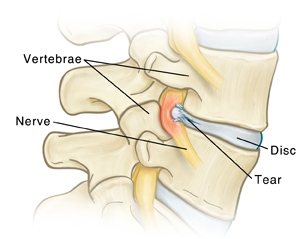Herniated Intervertebral Disc
A herniated disc happens when a spinal disc tears. Spinal discs are gel-filled cushions that sit between the bones of the spine (vertebrae). If a disc tears, the center may bulge out. The disc may then press on nearby nerves. This can cause severe pain. You may also have numbness or tingling in an arm or leg (sciatica). In very severe cases, you may no longer be able to control your bladder or bowel (incontinence) or move part or all of your body (paralysis).
You may need X-rays of the spine. If you've had the pain for a few weeks and it isn't getting better after treatment, you may need an MRI scan. Treatment for a herniated disc often includes physical therapy, pain medicines, and home care. Surgery is often done only if the nerve problem causes weakness, numbness, or pain that doesn't improve with other treatments.

Home care
Your health care provider may advise you to take medicines to help ease pain, spasms, and swelling. These medicines may be prescription or over-the-counter pain relievers, such as ibuprofen or naproxen. Take all medicines as directed.
Changing your daily habits can also help manage pain.
For neck pain:
For back pain:
-
Try not to sit for long periods, especially if your low back is affected. Sitting puts more stress on the low back than standing or walking.
-
Sleep on a firm mattress with a pillow under your knees.
-
Have a regular exercise program to help strengthen the muscles that support the spine.
-
Don't do complete bed rest. It often isn’t helpful. It may even make your condition worse.
General care
-
During the first 2 days after a pain flare-up, put an ice pack on the painful area for 20 minutes. Use the ice pack every 2 to 4 hours. This helps reduce swelling and pain. To make an ice pack, put ice cubes in a plastic bag that seals at the top. Wrap the bag in a clean, thin towel or cloth. Never put ice or an ice pack directly on the skin.
-
Physical therapy or osteopathic manipulative therapy may help if the pain doesn’t go away. Talk with your health care provider about these therapies.
Follow-up care
Follow up with your health care provider, or as advised. This is very important. If you’ve been referred to a specialist, make an appointment right away.
When to get medical advice
Contact your health care provider right away if:
-
Your back pain gets worse.
-
You have new weakness, numbness, or pain in one or both arms or legs.
-
You have numbness or tingling in your buttock or groin area.
-
Your foot drags as you walk, or you have new weakness in a foot.
-
You can’t control your bowel or bladder.
-
You aren’t able to have a bowel movement or pass urine.
-
You have a fever of 100.4°F (38°C) or higher, or as advised by your provider.
-
You have new symptoms.
Online Medical Reviewer:
Esther Adler
Online Medical Reviewer:
Raymond Kent Turley BSN MSN RN
Online Medical Reviewer:
Sravani Chintapalli Researcher
Date Last Reviewed:
3/1/2025
© 2000-2025 The StayWell Company, LLC. All rights reserved. This information is not intended as a substitute for professional medical care. Always follow your healthcare professional's instructions.